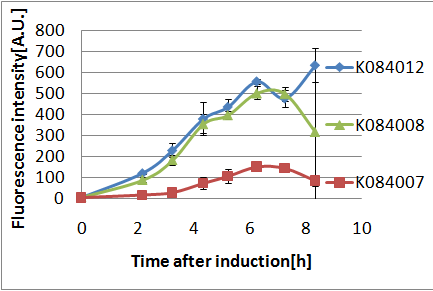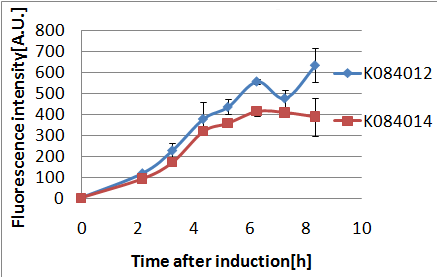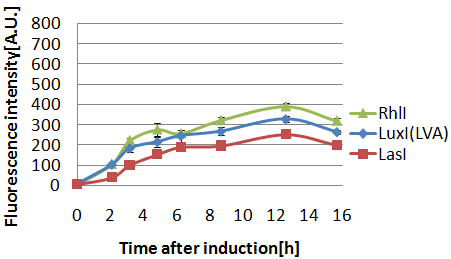Team:Chiba/Sender experiments/Senders(XL10Gold) T9002(JW1908)
From 2008.igem.org
(→Sender culture:500μL,Receiver culture:500μL) |
(→Reaction temparature:30°C) |
||
| Line 65: | Line 65: | ||
*Fig. 7 | *Fig. 7 | ||
| - | + | *Result | |
#The highest maximum fluorescence intensity was caused by RhlI gene,followed by LuxI(with LVA) and LasI gene. | #The highest maximum fluorescence intensity was caused by RhlI gene,followed by LuxI(with LVA) and LasI gene. | ||
#Fluorescence intensity of the two culture containing cells transformed with LuxI gene and RhlI gene amount to 200 for 2 hour as fast as LasI gene. | #Fluorescence intensity of the two culture containing cells transformed with LuxI gene and RhlI gene amount to 200 for 2 hour as fast as LasI gene. | ||
| - | + | *Discussion | |
#Maximum fluorescence intensity caused by RhlI gene was higher than that caused by LuxI gene.There are two reasons: | #Maximum fluorescence intensity caused by RhlI gene was higher than that caused by LuxI gene.There are two reasons: | ||
#RhlI was more active at this experimental condition. | #RhlI was more active at this experimental condition. | ||
Revision as of 08:20, 30 October 2008
| Home | The Team | The Project | Parts Submitted to the Registry | Reference | Notebook | Acknowledgements |
|---|
Results
Reaction temparature:37°C
Sender culture:500μL,Receiver:500μL
- Fig. 1
- results
Cultures containing cells transformed with LuxI gene([http://partsregistry.org/Part:BBa_K084012 BBa_K084012])and cells transformed with RhlI gene([http://partsregistry.org/Part:BBa_K084008 BBa_K084008]) express gfp and fluorescence intensity was reached to 500.Cultures containing cells transformed with LasI gene([http://partsregistry.org/Part:BBa_K084007 BBa_K084007]) weakly expressed gfp,and fluorescence intensity was not reached to a significant level.
- Discussion:Maximum fluorescence intensity was vary,however,time before gfp expression doesn't differ.
- We concluded that LasI gene([http://partsregistry.org/Part:BBa_K084007 BBa_K084007]) was not work well at this condition.
- Fig. 2
- Results
Fluorescence intensity of the culture containing cells transformed with LuxI gene([http://partsregistry.org/Part:BBa_K084012 BBa_K084012]) was lower than that of the cultures containing the cells transformed with LVA LuxI-LVA gene([http://partsregistry.org/Part:BBa_K084014 BBa_K084014]).The difference of maximum fluorescence intesity between the two cultures was 200.
- Discussion
- The rate of AHL synthesis decreased by the degradation of autoinducer synthase,however,the length of time before gfp expression is same.
- Fig. 3
- Results
Cultures containing cells transformed with RhlI gene([http://partsregistry.org/Part:BBa_K084008 BBa_K084008]) and RhlI+LVA([http://partsregistry.org/Part:BBa_K084009 BBa_K084009]) draw the same transfer curve.
- Discussion
- We concluded that there was no effect of LVA-tag on time before gfp expression.
Sender culture:100μL,Receiver:1000μL
Sender culture:10μL,Receiver:1000μL
Reaction temparature:30°C
- Sender culture:500μL, Receiver culture:500μL
- Fig. 7
- Result
- The highest maximum fluorescence intensity was caused by RhlI gene,followed by LuxI(with LVA) and LasI gene.
- Fluorescence intensity of the two culture containing cells transformed with LuxI gene and RhlI gene amount to 200 for 2 hour as fast as LasI gene.
- Discussion
- Maximum fluorescence intensity caused by RhlI gene was higher than that caused by LuxI gene.There are two reasons:
- RhlI was more active at this experimental condition.
- LuxI was well degraded by protease.
- We concluded that LVA-tag effective in this condition.
- Fig. 8
- Result
- Comparing RhlI with Rhl+LVAtag, fluoroscence intensity were almost same.
- Discussion
- In this condition, production efficiency of LuxI protein higher than of LVAtag.
Reaction temparature:25°C
Sender culture:500μL,Receiver culture:500μL
- Fig.9
- result
- The value of fluoroscence intensity by LuxI, RhlI, LasI gene at 25c° were almost the same as negative control at 30 and 37c°.
- The last value of fluoroscence intensity by LasI gene was a half of LuxI and RhlI.
- Discussion
- Low temperature of 25c° caused decrease of production efficiency of AHL synthase.
- Static culture keep sender and receiver from shaking, in the end , expression of GFP decreased.
- result
- Fig.10
- Result
- The fluoroscence intensity by RhlI with LVAtag is less than RhlI without LVAtag.
- Discussion
- LVAtag is effective in this condition.
- Result
|Back to Sender experiment and result
 "
"










